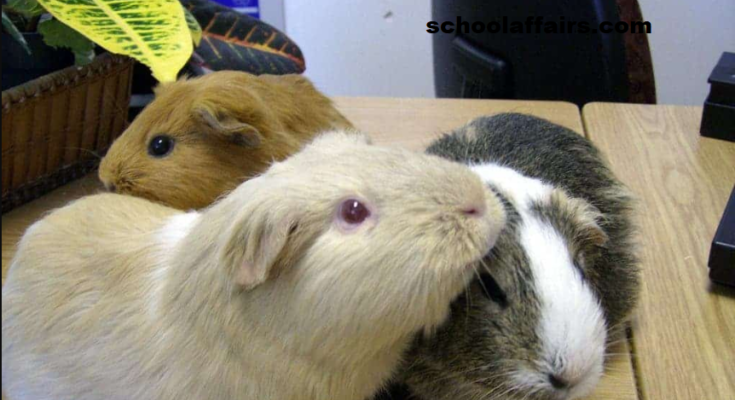Switzerland Prohibits the Ownership of Just One Guinea Pig – Switzerland is known for its breathtaking landscapes, precision watches, and efficient public transportation.
However, hidden amidst this scenic beauty lies a fascinating and relatively unknown law that sets it apart from many other nations: It is illegal to keep only one guinea pig as a pet in Switzerland. While this may seem like an odd rule, it reflects the country’s deep commitment to animal welfare and social behavior.
Guinea pigs are wonderful animals who can make great companions for a variety of families; they’re gentle, tiny, and have amazing personalities. Not to mention every single one of them is as cute as a button! Guinea pigs get to know their people, get excited to see them, and love to spend time with their families.
Guinea pigs tend to be one of the better pet choices for families with children who are looking for a small companion. Like all small animals, guinea pigs can be fragile and easily startled, so an adult should always supervise and guide children when they are handling them.
Keep in mind: although many children love these fuzzy little potatoes with legs, sometimes they lose interest and ultimately it will be the adult’s responsibility to make sure they are loved and cared for.
Let’s delve into the reasons behind this intriguing law and its cultural significance in the country…
The Fascinating Sociality of Guinea Pigs
Guinea pigs, scientifically known as ‘Cavia porcellus’, are small rodent natives to the Andes Mountains of South America. They have been domesticated for centuries and are popular pets due to their gentle temperament and charming personalities. One of the key characteristics of guinea pigs is their social nature.
In the wild, they live in groups of 10, forming complex social structures that include hierarchies and social interactions. They can even communicate with each other through various vocalizations and body language.
This social bond is integral to their well-being and separating a guinea pig from its companions can lead to severe stress and loneliness.
In addition to this, the social dynamics of the group play a pivotal role in shaping the socialization, upbringing, behavior, and stress-coping mechanisms of guinea pigs. Within group living settings, extensive socialization occurs, enabling guinea pigs to acquire essential skills and comprehend dominance structures based on hierarchy.
Early exposure to group dynamics is crucial for them, as it aids in comprehending each individual’s role within the group and the expectations tied to hierarchical positions. This understanding serves to mitigate their stress levels and enhance their overall well-being.
Humans, parrots, guinea pigs, and goldfish , what all these species have in common is that they are social creatures, meaning they require social interaction and companionship to thrive. In Switzerland, a 182-page Animal Protection Ordinance published in 2008 outlines regulations on how hundreds of domestic species must be kept.
This includes guinea pigs, which the Federal Food Safety and Veterinary Office describes as “very social animals (that) may not be kept on their own.”Keeping a solitary guinea pig is considered animal abuse, and perpetrators can face penalties if caught.
Guinea pig matchmaking has even taken off in the country, as these creatures can get very attached to their owners and cage mates and can be surprisingly picky with their friends.
If one guinea pig’s partner dies, it can become a headache for owners to find another to take its place.
This is why Swiss animal lover Priska Küng runs a ‘rent-a-guinea pig’ service for those who need to find short-term partners for their furry friends. “Because (guinea pigs) hardly ever die at the same time, even if they are the same age, people who don’t want a new guinea pig and lose one of their two animals need an interim solution,” she tells ZME Science.
Aside from this legislation on guinea pig ownership, Switzerland has quite a few other pet-friendly laws. These range from reasonable, such as a law that makes it mandatory for dog owners to take a course that teaches them how to care for their pets to the outlandish, like a law that makes it an offence for a person to force poultry to wear glasses or contact lenses.
“Because (guinea pigs) hardly ever die at the same time, even if they are the same age, people who don’t want a new guinea pig and lose one of their two animals need an interim solution,” she tells ZME Science.
Aside from this legislation on guinea pig ownership, Switzerland has quite a few other pet-friendly laws.
These range from reasonable, such as a law that makes it mandatory for dog owners to take a course that teaches them how to care for their pets to the outlandish, like a law that makes it an offence for a person to force poultry to wear glasses or contact lenses.
Scientific Evidence Affirming the Assertion
In accordance to research conducted by Norbert Sachser, a biotechnological scientist, and documented on the website of the National Library of Medicine, US, “Male guinea pigs raised in colonies (CM) were compared to those raised in isolation (IM). CM showed higher testosterone and cortisol levels, adrenal activity, and seminal vesicle weights at 19 months.
Behavioral differences were observed for a period of fourteen months, with CM engaging in more aggressive encounters. When IM was introduced to colonies later, they experienced weight loss and social challenges, possibly impacting reproduction.”
The study highlighted significant differences in hormone levels, reproductive organ development, and social interactions between CM and IM guinea pigs, suggesting that early-life isolation can have lasting effects on various physiological and behavioral aspects in adult guinea pigs.
Therefore, it is not surprising that Switzerland’s law prohibits the ownership of a single guinea pig. It may seem quirky at first glance but it embodies the nation’s strong pledge to take care of its animal life. Guinea pigs, like humans, thrive on companionship, and by mandating that, they be kept in pairs or groups.
Conclusion
However, Switzerland ensures that these adorable rodents enjoy happy and fulfilling lives. Their law serves as a touching reminder of the lengths to which some countries go to protect the well-being of creatures.
It also encourages us to look into the social and emotional needs of our pets by realizing that companionship and a caring environment are essential for their contentment.



